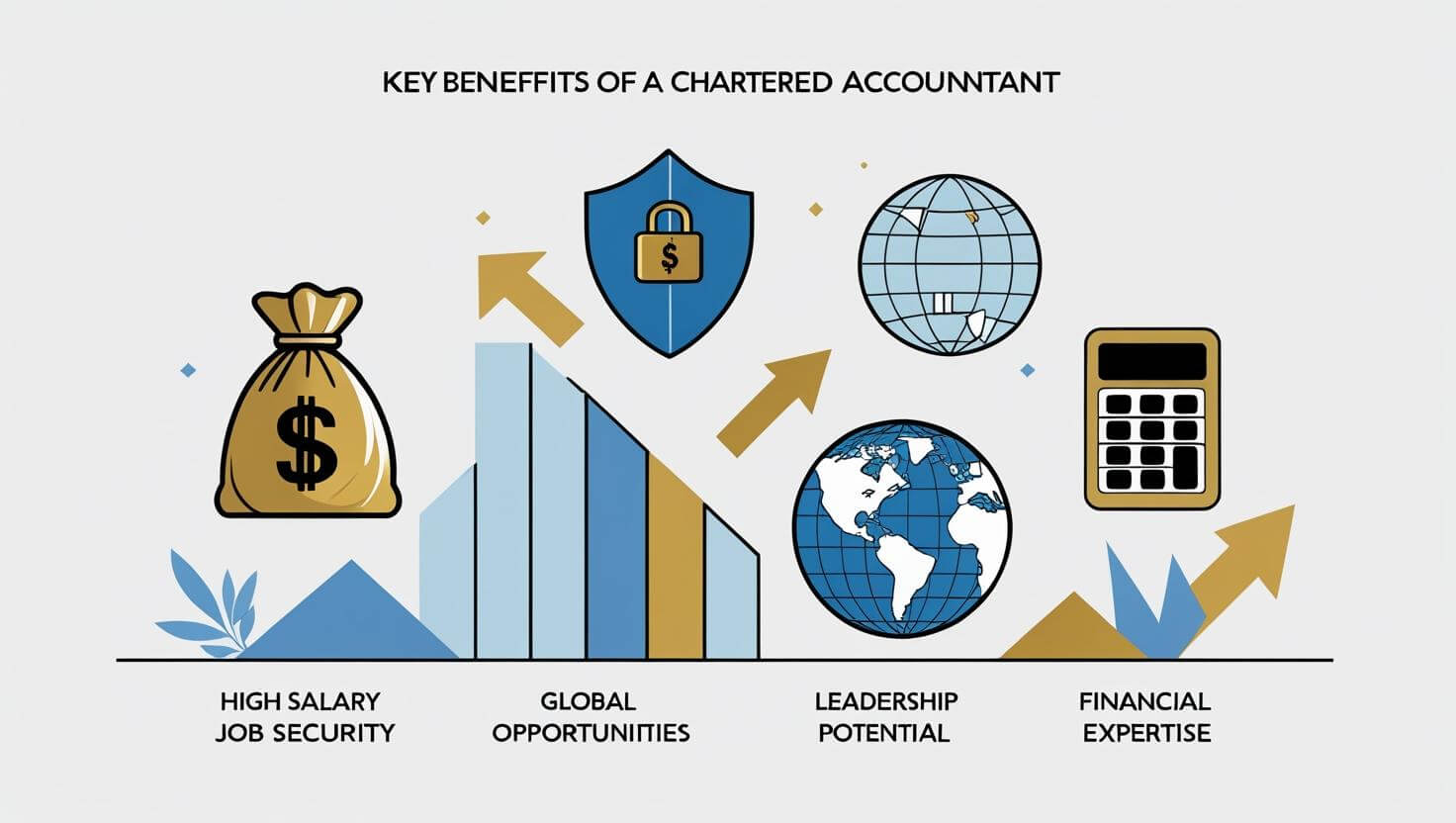In today’s fast-paced economy, numbers tell the story of every successful business—and chartered accountants are the experts who know how to read them. As the demand for financial transparency and compliance rises, more U.S. companies are turning to professionals with a global edge. That’s where chartered accountancy comes in. The Chartered Accountants Benefits go beyond just crunching numbers—it’s about offering strategic insight, maintaining financial compliance, and delivering trusted tax advisory services that drive business decisions forward.
Whether you’re a student considering career paths or a business owner needing expert support, understanding the chartered accountants benefits could open doors to smarter finance, stronger planning, and global opportunity. The numbers add up—and they point to impact.
What Is a Chartered Accountant (CA)?
A chartered accountant is a financial professional with an international accounting designation. The role is equivalent to a CPA USA equivalency but used outside the United States. CAs are trained through a professional education program and certified by accounting bodies (ICAEW, CICA, etc.). The CA certification process involves passing exams and gaining practical accounting experience.
In accounting, a certified public accountant (CA) possesses extensive knowledge of financial compliance, applied finance, and management accounting. CAs work in various sectors, including private firms, government agencies, and multinational corporations.
Duties and Responsibilities of Chartered Accountants (CAs)
A chartered accountant’s responsibilities are extensive and significant. They manage financial reporting, advise on accounting regulations by country, and offer audit and assurance services. In the U.S., CAs often take roles related to business finance roles and serve as consultants.
A chartered accountant job description also includes preparing budgets, analyzing cost control, and providing accurate taxation and audit records. Many also advise companies on financial strategies, manage risks, and help with regulatory filings.
How to Become a Chartered Accountant (CA)
If you’re wondering how to become a CA, it starts with meeting accounting degree requirements. A bachelor’s degree in accounting, finance, or a similar discipline is required. After that, you must join a professional education program approved by recognized accounting bodies (ICAEW, CICA, etc.).
The CA certification process includes exams in applied finance, management accounting, and financial compliance. You also need to complete an internship for CA training, which provides essential practical accounting experience.
Job Outlook and Salary for CAs
The chartered accountant salary varies by experience and location. In the U.S., the average annual salary is competitive, often higher than the general accountant average. The accountant job outlook in the U.S. shows strong growth. The Bureau of Labor Statistics expects steady demand with thousands of new jobs created each year.
The table below shows the average annual salary by region:
| Region | Average CA Salary (USD) |
| Northeast USA | $85,000 – $110,000 |
| Midwest USA | $75,000 – $95,000 |
| West Coast USA | $90,000 – $120,000 |
| Southeast USA | $70,000 – $90,000 |
This trend supports a positive accountant job outlook with increasing roles in financial reporting and financial consulting services.
Chartered Accountant (CA) vs. Certified Public Accountant (CPA)
The CA vs CPA differences come from geography, training, and certifications. A CA is certified by international bodies like ICAEW (UK), CICA (Canada), or CAANZ (Australia and New Zealand). A CPA is licensed in the U.S. by state boards.
Both offer audit and assurance, but CAs often focus on international accounting designation and accounting procedures in global contexts. CPAs may have more localized knowledge. Through reciprocity agreements, some CAs can work as CPAs in the U.S. if they pass certain exams.
What distinguishes a certified public accountant from a chartered accountant?
The main difference lies in how they are certified. CAs follow an international track, while CPAs are U.S.-based. But in terms of job duties, both perform similar functions like tax advisory services, financial compliance, and management accounting.
CAs often take roles that require cross-border accounting regulations by country, especially in multinational firms. CPAs usually serve in state-licensed roles within the U.S.
How Do I Become a Chartered Accountant (CA)?
To start your journey, earn a degree in accounting or a related field. Next, join a professional education program approved by an international accounting body. Complete your exams, gain internship for CA training, and finish your practical accounting experience.
You may also need to pass U.S. equivalency exams if you want to work under CPA titles in the U.S. due to reciprocity agreements.
How Much Do Accountants Make and What Is Their Employment Prospect?
The job growth for accountants in the U.S. is about 6% over the next ten years. This rate is faster than average. With the rise of global finance, the demand for accountants with accounting certifications globally continues to rise.
A CA can work in industries such as healthcare, tech, manufacturing, and government. Many also work in financial consulting services or start their own business finance roles.
Chartered Accountants Benefits
Being an accountant offers a long list of personal and professional benefits. These include skill development, job security, and financial rewards. The chartered accountants benefits include higher earning potential, respect in the business world, and diverse career options.
1. Accountants Have a Better Understanding of Finances
Accountants are trained in applied finance and management accounting, giving them a deep knowledge of how money flows through businesses. This knowledge helps them make informed decisions and guide others.
2. The Growing Demand for Accountants
With rapid changes in technology and regulations, there is a high need for experts in financial reporting, taxation and audit, and financial compliance. This creates a secure and growing job market.
3. Opportunities for Advancement
Accountants can rise to leadership roles. They can become CFOs, financial directors, or start their own firms offering tax advisory services and financial consulting services.
4. The Pay Range for Accountants is Competitive
In general, the salaries are appealing. Internationally experienced certified professionals make more than the average salary. The U.S. market values accountants with accounting certifications globally.
5. The Ability to Start Your Own Business
With the right experience, accountants can create businesses offering audit and assurance, business finance roles, and consulting. Many become successful entrepreneurs.
6. Improving Knowledge of Business Law and Taxation
Training as an accountant includes learning about accounting regulations by country, taxation and audit, and corporate law. This helps them stay compliant and give advice to businesses.

Opportunities in Accounting
Accounting offers many career paths. Some focus on public accounting, others on financial reporting or corporate finance. There are also specialized areas like management accounting and financial consulting services.
Accounting is needed in every sector. This includes healthcare, real estate, entertainment, government, and non-profit.
Accounting Job Outlook
The future looks bright for accountants. The U.S. expects thousands of new accounting jobs in the next decade. Businesses want experts who can ensure financial compliance, manage taxation and audit, and understand applied finance.
As regulations grow more complex, the demand for skilled professionals will increase.
FNU’s Accounting Degree Program
Florida National University (FNU) offers programs to help students start their accounting careers. These programs meet the accounting degree requirements and prepare you for both CPA and CA paths.
The courses cover audit and assurance, management accounting, and financial reporting, giving students a strong foundation.
Enroll in an FNU Accounting Program Today
If you’re interested in becoming a CA or CPA, enrolling in an FNU program is a great first step. The university offers online and campus classes. It also connects students to internship for CA training and job placements.
To learn more, contact the admissions office or visit their official website.
Top 10 Chartered Accountants Benefits
1. Job Security
Accounting is one of the most secure professions. The demand never slows, even during economic downturns.
2. Tons of Industry Opportunities
Every industry needs accountants. From tech companies to hospitals, your skills will always be in demand.
3. High Salary
The pay is excellent, especially for those with accounting certifications globally. Salaries increase with experience.
4. Fringe Benefits
Accountants often get bonuses, insurance, retirement plans, and education reimbursements.
5. Opportunities for Advancement
There is a clear path to leadership. You can become a CFO, director, or open your own firm.
6. A Great Professional Network
The accounting world is well-connected. It opens doors to be a member of accounting bodies (ICAEW, CICA, etc.).
7. Career Diversity
You can specialize in financial consulting services, taxation and audit, or applied finance.
8. Travel and Tech
Global firms offer chances to travel. Accounting also uses the latest tech tools and data systems.
9. A Rewarding Role
Helping people and businesses manage money brings great satisfaction.
10. Prestige
Accountants are respected advisors. Becoming a CA means joining an elite group.
3 Cons of Being an Accountant
Accounting has its challenges. Especially during tax season, the work can be taxing. You also need to keep up with evolving regulations and technological advancements.
Some roles may involve long hours, but the rewards often outweigh the effort.
Final Thoughts
The chartered accountants benefits make this profession a smart choice for U.S. professionals. Whether you’re interested in CA vs CPA paths, or just starting with an accounting degree, the opportunities are vast.
With high salaries, job growth, and global mobility, becoming a chartered accountant offers long-term success. Explore your options today and begin your journey toward a rewarding future.
FAQs:
What are the benefits of being a chartered accountant?
Chartered accountants enjoy high earning potential, global career opportunities, job security, and respected professional status.
What kind of benefits do accountants get?
Competitive pay, bonuses, health benefits, retirement plans, and possibilities for growth are frequently offered to accountants.
Is it worth being a chartered accountant?
Yes, becoming a chartered accountant is highly rewarding due to long-term career stability, international recognition, and diverse job roles.
What are the benefits of a CA firm?
A CA firm offers professional credibility, scalable income, control over client relationships, and the chance to specialize in areas like tax or audit.
What are the benefits of being chartered?
Being chartered signals elite qualification, enhances career prospects, and grants access to global professional networks.


